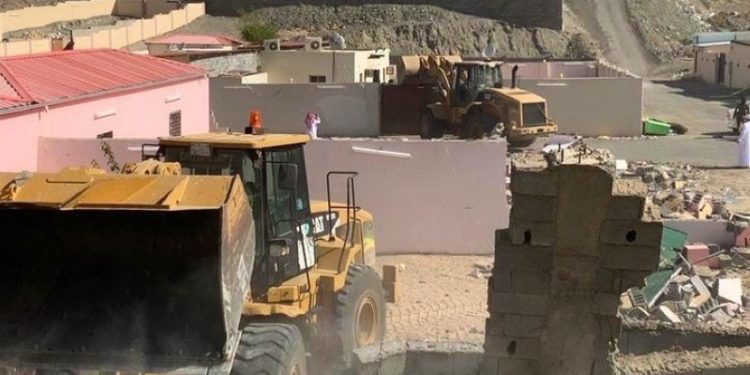
The incident of the killing of a ten-year-old girl in the Aseer region, after the demolition of her family’s home, caused widespread shock and anger in the Saudi street.
The killing of the girl Noura came days after a state of great anger prevailed in Al-Faihaa neighbourhood in the city of Makkah, after the Saudi authorities demolished the homes and properties of citizens, and displaced them in outside without shelter.
Saudi citizens resort to building their homes in the Al-Faihaa district, north of Mecca, to avoid the high real estate prices in the city, which is witnessing tourist prices and accelerated construction of hotels and villas for Saud House.
The General Administration of Municipalities Affairs, represented by the Municipality of Umrah, a subsidiary of the Municipality of the Holy Capital, in cooperation with the Saudi security services and the slaughter units, surprised the demolition of the homes and properties of citizens in Al-Faiha.
Attempts by citizens to defend their lands and private property as a result of the heavy security presence to suppress any attempt to object to the demolition process did not succeed.
According to the mayor of the Umrah sub-municipality, Omar bin Abdul-Rahman Al-Maliki, the demolitions included 47 sites, which are armed and popular buildings, fenced lands with a total area of 34,000 square meters, in addition to the removal of barracks, tents, and sheep sheds over large areas of land.
Citizens of the Saudi slaughter units demolishing their homes and properties denied the validity of the claims of the Umrah sub-municipality, asserting that their homes were built on their privately owned lands.
Security services and the slaughtering units carried out the demolitions without regard for the legal aspect, or the declared state of emergency as a result of the outbreak of the Coronavirus in the Kingdom.
They demanded that the Saudi authorities compensate them financially, and provide temporary homes until they return to their new homes.
In the middle of last April, Saudi security forces killed the citizen Abdul Rahim Al-Huwaiti, who posted a series of videos on social media, in which he criticized the forcing of his tribe to leave the land where they had lived for generations at the site of “Neom” project in Tabuk Province, describing it as terrorism.
Al-Hwaiti expected that his opposition may lead to his killing.
Saudi security later announced that Al-Hwaiti was killed in an exchange of fire with the security forces, noting that a number of weapons had been found in his home, knowing that there is an ownership of weapons within the tribe.
Prisoners of Conscience, which deals with violations of freedom of opinion in the Kingdom, reported that the Saudi authorities arrested eight members of the al-Huwaytat tribe.
The Saudi authorities then sought to mislead the media and deny the information received about the opposition of the members of the Al-Huwaitet tribe to the decision, by pressing members of the tribe to participate in a mass festival in which they declared innocence from Abdul Rahim Al-Huwaiti.
Despite this, the killing of Al-Hwaiti sparked a widespread wave of condemnation on social media, as thousands of Arab activists have circulated a hashtag, such as # martyrdom of Abd al-Rahim al-Huwaiti, # Abd al-Rahim _ Al-Hwaiti, and # Al-Hwaitat against the deportation of Nayoum.
International human rights organizations said that the previous violations took place in the context of a broad campaign of civil rights and freedom of peaceful opposition in the Kingdom, which has escalated in recent years.
Since Bin Salman became the crown prince in 2017, arbitrary arrests have escalated, prolonged periods of detention, and increased the severity of torture, executions, killings and stalking inside and outside the Kingdom.
Accordingly, international human rights organizations called upon the companies operating in the Saudi Neom project to stop their participation in the construction of the city located in Tabuk Governorate, which is being built at the expense of the lands of the Al-Huwaytat tribe.
Human rights organizations expressed concern about the repeated violations committed by the Al-Saud authorities in their campaign to displace some of the members of the Al-Huwaytat tribe in favor of the smart “Neom” project.